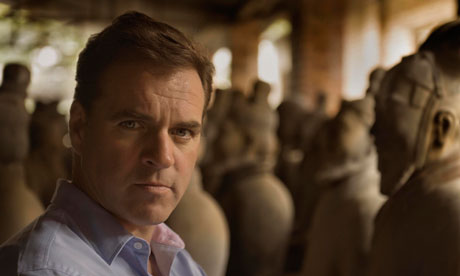From curriculum rows to Niall Ferguson's remarks on Keynes, our past is the fuel for debate about the future

Historian Niall Ferguson: 'Part of a worryingly conservative consensus when it comes to framing our national past.' Photograph: Channel 4
The bullish Harvard historian Niall Ferguson cut an unfamiliar, almost meek figure last week. As reports of his ugly suggestion that John Maynard Keynes's homosexuality had made the great economist indifferent to the prospects of future generations surged across the blogosphere, Ferguson wisely went for a mea culpa.
So, in a cringeing piece for Harvard University's student magazine, the professor, who usually so enjoys confronting political correctness, denied he was homophobic or, indeed, racist and antisemitic for good measure.
Of course, Ferguson is none of those things. He is a brilliant financial historian, albeit with a debilitating weakness for the bon mot. But Ferguson is also part of a worryingly conservative consensus when it comes to framing our national past.
For whether it is David Starkey on Question Time, in a frenzy of misogyny and self-righteousness, denouncing Harriet Harman and Shirley Williams for being well-connected, metropolitan members of the Labour movement, or the reactionary Dominic Sandbrook using the Daily Mail to condemn with Orwellian menace any critical interpretation of Mrs Thatcher's legacy, the historical right has Britain in its grip.
And it has so at a crucial time. The rise of Ukip, combined with David Cameron's political weakness, means that, even in the absence of an official "in or out" referendum on our place in Europe, it looks like we will be debating Britain's place in the world for some years to come. And we will do against the backdrop of Michael Gove's proposed new history curriculum which, for some of its virtues, threatens to make us less, not more, confident about our internationalist standing.
For as Ferguson has discovered to his cost, history enjoys a uniquely controversial place within British public life. "There is no part of the national curriculum so likely to prove an ideological battleground for contending armies as history," complained an embattled Michael Gove in a speech last week. "There may, for all I know, be rival Whig and Marxist schools fighting a war of interpretation in chemistry or food technology but their partisans don't tend to command much column space in the broadsheets."
Even if academic historians might not like it, politicians are right to involve themselves in the curriculum debate. The importance of history in the shaping of citizenship, developing national identity and exploring the ties that bind in our increasingly disparate, multicultural society demands a democratic input. The problem is that too many of the progressive partisans we need in this struggle are missing from the field.
How different it all was 50 years ago this summer when EP Thompson published The Making of the English Working Class , his seminal account of British social history during the Industrial Revolution. "I am seeking to rescue the poor stockinger, the Luddite cropper, the 'obsolete' hand loom weaver, the 'utopian' artist ... from the condescension of posterity," he wrote.
He did so in magisterial style, providing an intimate chronicle of the brutality inflicted on the English labouring classes as Britain rose to be the workshop of the world. Thompson focused on the human stories – the Staffordshire potters, the Manchester Chartists – to build an account of an emergent, proletarian identity. It was social history as a political project, seeking to lay out all the tensions and conflict that really lie behind our island story.
As his fellow Marxist Eric Hobsbawm put it, social history was "the organisational and ideological history of the labour movement". Uncovering the lost lives and experiences of the miner and mill worker was a way of contesting power in the present. And in the wake of Thompson and Hobsbawm's histories – as well as the work of Raphael Samuel, Asa Briggs and Christopher Hill – popular interpretations of the past shifted.
In theatre, television, radio and museums, a far more vernacular and democratic account of the British past started to flourish. If, today, we are as much concerned about downstairs as upstairs, about Downton Abbey's John Bates as much as the Earl of Grantham, it is thanks to this tradition of progressive social history.
It even influenced high politics. In the flickering gloom of the 1970s' three-day week, Tony Benn retreated to the House of Commons tearoom to read radical accounts of the English civil war. "I had no idea that the Levellers had called for universal manhood suffrage, equality between the sexes and the sovereignty of the people," he confided to his diary. Benn, the semi-detached Labour cabinet minister, felt able to place himself seamlessly within this historical lineage – lamenting how "the Levellers lost and Cromwell won, and Harold Wilson or Denis Healey is the Cromwell of our day, not me".
But despite recent histories by the likes of Emma Griffin on industrialising England orEdward Vallance on radical Britain, the place of the progressive past in contemporary debate has now been abandoned. So much of the left has mired itself in the discursive dead ends of postmodernism or decided to focus its efforts abroad on the crimes of our colonial past. In their absence, we are left with Starkey and Ferguson – and BBC2 about to air yet another series on the history of the Tudor court. How much information about Anne Boleyn can modern Britain really cope with?
This narrowing of the past comes against the backdrop of ever more state school pupils being denied appropriate time for history. While studying the past is protected in prep schools, GCSE exam entries show it is under ever greater pressure in more deprived parts of the country.
Then there is the question of what students will actually be learning. Michael Gove's proposed new syllabus has rightly been criticised by historian David Cannadine and others as too prescriptive, dismissive of age-specific learning and Anglocentric. While the education secretary's foregrounding of British history is right, experts are adamant this parochial path is not the way to do it. Indeed, cynics might wonder whether Gove – the arch Eurosceptic – is already marshalling his young troops for a referendum no vote.
For whether it is the long story of Britain's place in Europe, the 1930s failings of austerity economics, the cultural history of same-sex marriage or the legacy of Thatcherism, the progressive voice in historical debate needs some rocket boosters. Niall Ferguson's crime was not just foolishly to equate Keynes's homosexuality with selfishness. Rather, it was to deny the relevance of Keynes's entire political economy – and, in the process, help to forge a governing consensus that is proving disastrous for British living standards.
That is what we need an apology for.

No comments:
Post a Comment